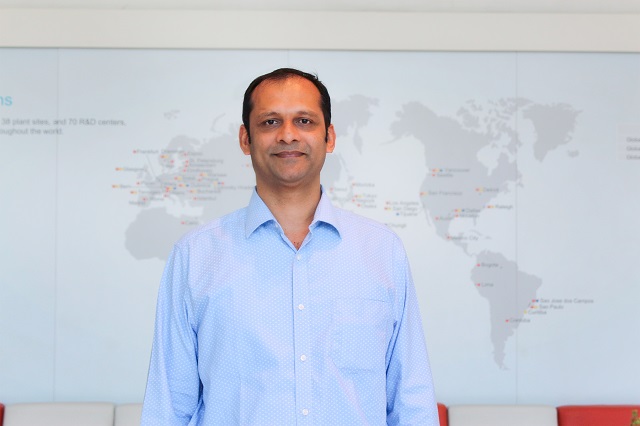Delta Electronics is committed to investing and expanding operations to capitalize on the growing opportunities in the Indian market

CXOToday has engaged in an exclusive interview with Mr. Niranjan Nayak, Managing Director, Delta Electronics India
- Where does India stand for Delta Electronics as part of its overall strategy?
In India, Delta Electronics has a significant presence in the energy and infrastructure sectors. Delta Electronics India Pvt. Ltd. is the Indian subsidiary of Delta Electronics, and it offers a wide range of products and solutions in the areas of power electronics, industrial automation, and infrastructure. Delta Electronics India has manufacturing facilities in several locations across India and employs over 3,000 people.
Delta Electronics has been expanding its operations in India over the years and has made significant investments in the country. In 2020, we have announced that we will invest over $500 million in India over the next five years to expand our manufacturing capabilities and build new research and development centres. This investment is part of Delta Electronics’ overall strategy to expand its presence in the Asia-Pacific region and leverage India’s growing market and skilled workforce.
Overall, Delta Electronics’ presence in India is an important part of its global strategy, and we are committed to investing and expanding our operations in India to capitalize on the growing opportunities in the Indian market.
- Please elaborate on the progress in your all business segments
Delta Electronics operates in several business segments, including power electronics, automation, and infrastructure. Here is some information on the progress of these segments:
Power Electronics Segment: Delta Electronics is a leading provider of power electronics products and solutions, including power supplies, uninterruptible power supplies (UPS), solar inverters, electric vehicle (EV) chargers, and more. The power electronics segment has been a significant contributor to Delta Electronics’ growth, with a focus on energy efficiency and sustainability. We have been making progress in this segment by developing new products and solutions that are more efficient and environmentally friendly.
Automation Segment: Delta Electronics also offers automation products and solutions, including industrial automation, building automation, and automotive electronics. The automation segment has been making progress by introducing new products and solutions that enhance productivity and efficiency while reducing costs. We are investing heavily in research and development in this segment to stay ahead of the competition and meet the evolving needs of our customers.
Infrastructure Segment: Delta Electronics’ infrastructure segment includes solutions for data centers, telecom networks, and smart cities. The infrastructure segment has been making progress by introducing new products and solutions that are more reliable and efficient, reducing downtime and energy consumption. We are focusing on building partnerships and collaborations to expand in this segment and drive innovation.
Overall, we have been making progress in our different business segments by investing in research and development, introducing new products and solutions, and expanding its presence in different markets. The company has a strong focus on sustainability and energy efficiency, which has helped it stay ahead of the competition and meet the evolving needs of its customers.
- What is your investment plan for India?
We have made significant investments in India over the years, and the company has announced plans to invest further in the country. In 2020, Delta Electronics announced that it would invest over $500 million in India over the next five years. The investment is part of Delta Electronics’ strategy to expand its operations in the India region and capitalize on the growing opportunities in the Indian market.
We would like to fulfil the investment before 2027. We are going to start manufacturing in Krishnagiri. Our complex at Krishnagiri has the potential to house more factories for both domestic and international markets with the SEZ. So it is only a matter of time before we utilise this potential further. We are bringing in more products from our different business groups in India to be manufactured in Krishnagiri for export as well as for use in the global market.
The investment plan includes building new manufacturing facilities, research and development centers, and innovation labs in India. Delta Electronics plans to focus on developing and manufacturing energy-efficient products and solutions that cater to the needs of the Indian market. The company also plans to collaborate with local partners and startups to drive innovation and support the development of India’s technology ecosystem.
Delta Electronics global has identified India as a strategic market, and we are committed to expanding our operations in the country. The investment plan is a significant step towards achieving this goal and strengthening Delta Electronics’ presence in India.
- Please elaborate on Delta Electronics’ carbon neutrality goals.
Delta Electronics is committed to sustainability and has set ambitious carbon neutrality goals to address the challenges of climate change. We have a comprehensive sustainability strategy that focuses on reducing carbon emissions and promoting environmental stewardship.
Here are some details about Delta Electronics India carbon neutrality goals:
Net Zero Carbon Emissions: Delta Electronics has set a goal to achieve net-zero carbon emissions by 2050. This means that the company plans to reduce its carbon emissions to as low as possible and offset any remaining emissions through measures such as carbon credits, reforestation, or other carbon sequestration methods.
Renewable Energy: We are committed to using renewable energy sources to power our operations. We have set a goal to source 50% of its electricity from renewable sources by 2025 and 100% by 2030. To achieve this goal, Delta Electronics is investing in renewable energy projects and working with partners to procure renewable energy.
Energy Efficiency: Delta Electronics is committed to improving energy efficiency in its products, operations, and supply chain. The company has set a goal to achieve a 50% reduction in energy intensity by 2025 and 80% by 2030. To achieve this goal, Delta Electronics is implementing energy-efficient technologies and practices in its operations and encouraging its suppliers to adopt similar measures.
Circular Economy: Delta Electronics is committed to promoting a circular economy by reducing waste, promoting recycling and reusing materials, and extending product lifecycles. The company has set a goal to achieve a 90% recycling rate for its waste by 2025 and to use 25% recycled materials in its products by 2030.
Overall, Delta Electronics’ carbon neutrality goals are an essential part of its sustainability strategy, and the company is committed to taking meaningful action to address the challenges of climate change. The company’s efforts to reduce carbon emissions, promote renewable energy, improve energy efficiency, and adopt circular economy practices demonstrate its commitment to sustainability and environmental stewardship.
- What are your short and long-term growth plans for India?
India stands as a pillar of its strategic long-term growth plans, as we have invested up to $500 million to develop our manufacturing capabilities in Krishnagiri. This investment is expected to cater to both exports and domestic businesses. We are assured on the Indian market and its human capital resources for skilled R&D and manufacturing.
We also made India a region within the company to sharpen its focus and dedicate more resources to the Indian market. As India gradually becomes one of the world’s major economic and manufacturing engines, Delta Electronics’ diversified portfolio of energy-saving products and solutions can help the country fulfill its industrial and environmental goals.
In the short term, we may focus on increasing market share and revenue in India by expanding its existing product offerings, penetrating new markets, and building partnerships with local companies. Improving operational efficiency, supply chain, and customer service may also be priorities.
In the long term, we will invest in developing new products and solutions tailored to the Indian market, investing in research and development, building new manufacturing facilities, and expanding its distribution network across the country. The company may also prioritize investments in renewable energy, energy efficiency, and the circular economy as part of its growth plans in India.
- Throw some light on Delta’s high-tech R&D lab in Bengaluru
Delta Electronics has a state-of-the-art R&D center located in Bengaluru, India. The center is focused on developing innovative technologies and solutions in the fields of power electronics, automation, and energy management.
The R&D center in Bengaluru is part of Delta Electronics’ global network of R&D centers and serves as a hub for innovation and technology development for the Indian market and beyond. The center is staffed by a team of highly skilled engineers and researchers who work on a wide range of projects, from developing new products to improving existing ones.
Some of the key areas of research at our R&D center in Bengaluru include renewable energy, electric vehicle charging infrastructure, and industrial automation. The center also collaborates with academic and research institutions in India to foster innovation and drive technological advancements.
Overall, our R&D center in Bengaluru is a critical component of the company’s global innovation strategy, helping to develop cutting-edge technologies and solutions that drive growth and competitiveness in India and beyond.
- What role does Artificial Intelligence play in the power sector?
Artificial Intelligence (AI) is playing an increasingly important role in the power sector, helping to improve the efficiency, reliability, and sustainability of power generation, transmission, and distribution. Here are some examples of how AI is being used in the power sector:
Predictive Maintenance: AI algorithms can analyze data from sensors and other sources to predict equipment failures before they occur, allowing for preventative maintenance to be performed. This can help reduce downtime, extend equipment life, and improve overall reliability. For example, AI can be used to analyze data from sensors installed in power generators to detect changes in performance that may indicate an imminent breakdown. This information can then be used to schedule maintenance before a failure occurs, reducing downtime and avoiding costly repairs.
Grid Optimization: AI can be used to optimize power grid operations by analyzing data on energy demand, weather patterns, and other factors to predict and manage energy supply and demand. This can help reduce energy waste, improve system efficiency, and prevent blackouts. For example, AI can be used to predict energy demand based on historical data and weather patterns, allowing grid operators to adjust energy supply in real-time to meet demand.
Energy Storage: AI can help optimize energy storage systems by predicting energy demand and supply patterns, and using that data to manage energy storage capacity and discharge. This can help improve the efficiency and reliability of energy storage systems. For example, AI can be used to predict energy demand based on historical data and weather patterns, allowing energy storage systems to be charged and discharged as needed to meet demand.
Renewable Energy: AI can help optimize the performance of renewable energy systems by analyzing weather data and other factors to predict energy production levels. This can help improve the reliability and cost-effectiveness of renewable energy systems. For example, AI can be used to predict the amount of energy that will be generated by a wind turbine based on wind speed and direction, allowing operators to adjust the turbine’s settings to optimize performance.
Overall, AI is playing an increasingly important role in the power sector, helping to improve the efficiency, reliability, and sustainability of power generation, transmission, and distribution. As AI technology continues to evolve, we can expect to see even more innovative applications in the power sector in the future.







